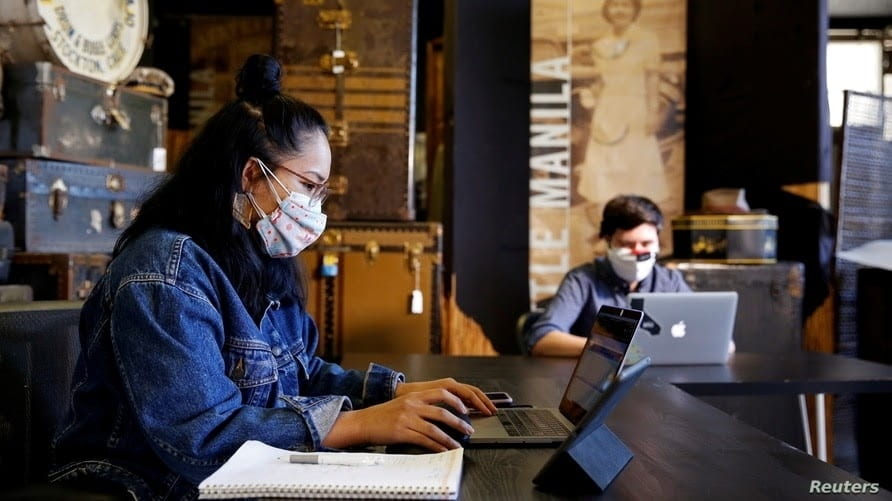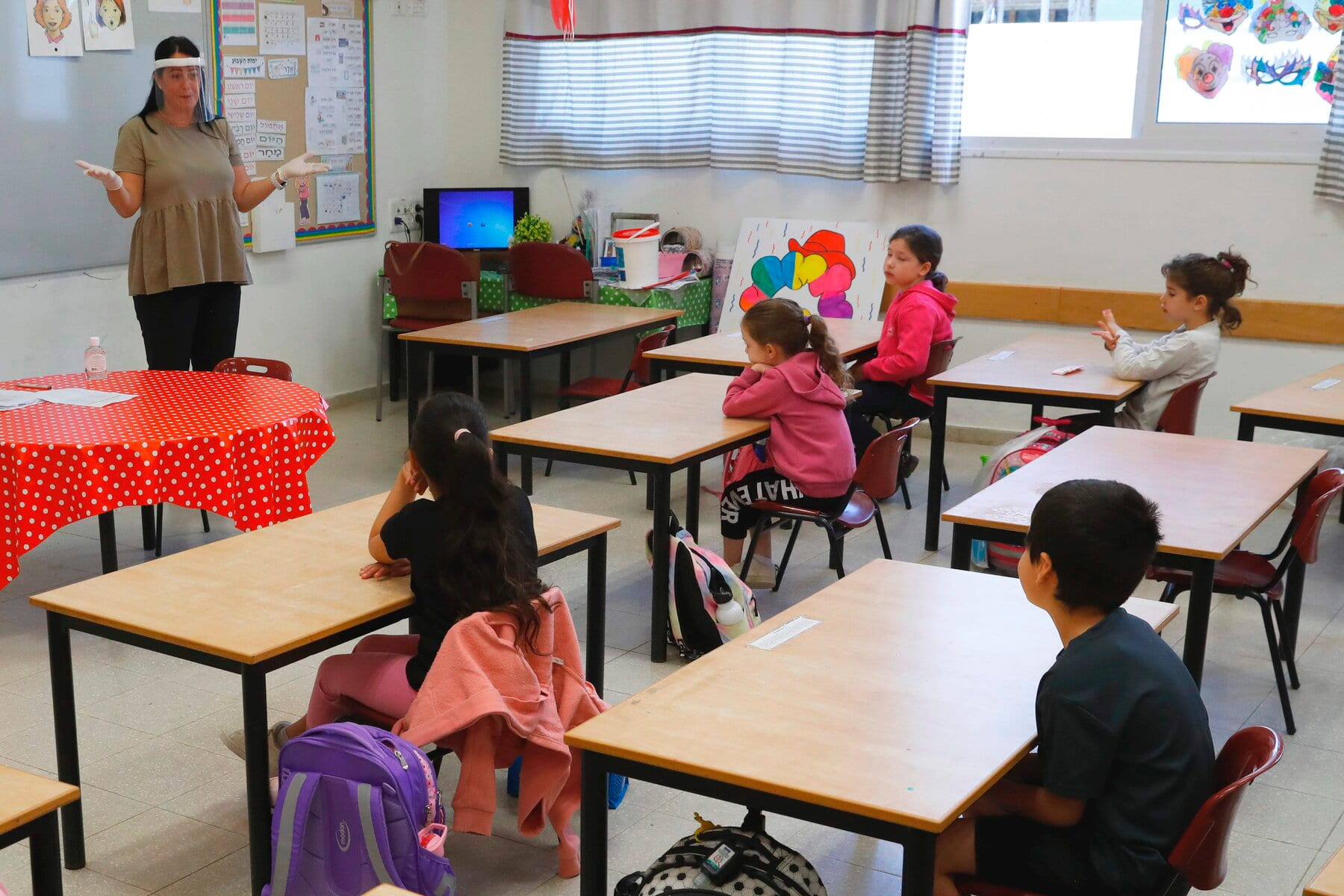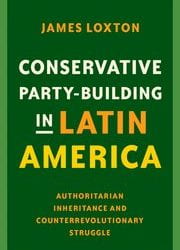Hope in Uncertain Times
The Covid-19 crisis represents a special opportunity to reimagine education and education systems. Currently, some educators, social entrepreneurs, and policy makers are developing innovative programs and interventions to catalyze transformation in our schools. During the last months, GENERA, the public policy firm that I lead, has collaborated with several organizations such as The Lego Foundation in Mexico, Educando by Worldfund and Fundación Mexicana para la Educación, la Tecnología y la Ciencia (FUNED) in the development and evaluation of initiatives for children and young people with the support of caregivers, teachers, principals, and mentors in selected Mexican states. We must follow that path keeping up the momentum for stronger partnerships to make things happen and address the most pressing challenges on education.

Classroom in Mexico following COVID restrictions (Photo by segundoasegundo.com).
Many educational leadership challenges have arisen from the very onset of this crisis. While I am writing this essay, millions of students, parents, teachers, principals and decision-makers in the education sector struggle during the current school year due to Covid-19. In a country like Mexico, where I live, more than 30 million students have been forced to learn remotely. Despite the efforts and policies implemented, the Mexican government, as many others, was not prepared to move towards a model of digital education.
Due to the unprecedented nature of Covid-19, many children from disadvantaged backgrounds are being left behind because of lack of resources such as computers and internet connectivity. They also face increasing levels of exclusion such as poverty, hunger, and vulnerability. The dire lack of health-care resources, investments and jobs—coupled with a drop in remittances from relatives—will erase the possibility to generate growth, prosperity, and opportunities for the society.
In response to school closures, the different stakeholders in the educational systems have faced this crisis with professionalism and commitment. Teachers have used as many means as possible. To carry out distance learning, several teachers and principals have reinvented their learning environments to adapt their teaching to this new reality—adapting their own homes in classrooms, altering their spaces to share, teach and inspire. In extreme cases, they have gone into debt buying materials and supplies to facilitate the teaching-learning process. In such a critical time, teachers and principals have combined different learning approaches (learning through play, game-based learning, educational apps, learning together in small groups, personalized learning) to ensure students are engaged and become digitally savvy.
For students, the abrupt changes in daily routines and isolation from their peers and teachers have presented concerns about their future. Suddenly, students moved from a face-to-face model to a virtual one. They have had no choice but to understand that “the new normality” would deprive them of socializing with other students. Collaboration is more difficult and learning and interaction through different modalities such as apps, platforms and web sites became mandatory. Students have been the silent witnesses of this transformation. Regularly, we in the educational field focus on learning, undoubtedly a key element, but often fail to analyze the scars this crisis and new learning processes will leave on the emotional states of our students. At times where learning can be messy and frustrating, students will be significantly impacted by rising stress, anxiety and depression.
Many families have faced complex adjustments to stay-at-home responsibilities dealing with anxieties that have arisen at a time of great uncertainty. As a parent and a professional, the challenge has been enormous. I’ve learned that having to combine both roles in a confined state implies patience, resilience and perseverance, skills that are difficult to maintain on a constant basis. I have worked remotely several times, but I have never done it with two children in virtual school and leading my own firm remotely for several months.

Working remotely during the pandemic (Photo by vozdeamerica.com).
In my professional field, education and public policy, Covid-19 exacerbated uncertainty. Projects, initiatives and contracts have been delayed or cancelled because of the pandemic. Despite this situation, I stayed calm and led in these turbulent times. First, I learned to be there for my team. The impulse to cut costs was intellectually understandable, but I resisted this impulse emotionally. I wanted to adopt a different response. Therefore, despite of the difficult moments, I decided to share with them a clear message: “We are going to get out of this, and we are going to do it together.” I became readily available for my team and to take into account what was going on their personal lives during this difficult situation. During 2020 and part of 2021, we decided to work remotely to keep the team safe. I encouraged them to prioritize health and their families before our professional duties. I was aware that productivity might decrease. However, we began to focus on strategic tasks and continue thinking on the individual first. This emphatic approach let us understand that well-functioning teams are very important to deal with crisis.
I have been very impressed by how our team has stepped up during these uncertain times. Members of our team helped others by contributing with actions—volunteering, research, sharing information—to deal with this pandemic. By the end of the first semester of this year, I realized that if empathy involves generosity and care, then my firm will have a unique opportunity to mainstream these qualities into our culture and vision. In sum, I have learned that values such as hope, compassion and kindness will transcend the way we lead during these times and will set the standard for our society.
Also, one of the greatest challenges that I have faced is to clearly communicate to my kids, my students and collaborators a narrative of hope, compassion and kindness. And it represents a difficult task. Covid-19 is particularly isolating since even family members are sometimes forced to keep their distance from their beloved ones to avoid the virus. Several times, we might think that everyone is facing this difficulty with the same resources than we have. This is not true. We are all facing this raging storm, but we need to recognize that not everyone is dealing it in the same conditions.
It is very hard to find balance in the emotional turmoil that we are facing. But I understood that I needed a more stable and solid emotional intelligence to lead. So, although what you communicate is important, how you do it and how you share it is crucial. While I was working with decision-makers, international foundations, school leaders, teachers and students, I realized that I was dealing a trust deficit due to poor leadership from different perspectives —public, private, social, and academic sectors. Therefore, I decided to share with them that we would get through this situation together and back it up with empathy and compassion to continue working for a better perspective for education. Our commitment was to support our partners and clients by solving problems and finding answers to help navigate this crisis. To adapt to this change, our firm suggested the development of action plans to address goals effectively by mitigating risks and assessing impact on their key stakeholders for our clients and partners.
I am trying, the best I can, to share advices and offer support to different clients—from international organizations to non-governmental organizations—revealing the need to both respond by designing and promoting creative solutions, while also figuring out a more equitable and resilient education systems for the short and medium term. I believe that the engine of any crisis response is alignment and, eventually, collaboration. FUNED, a social organization that provides financial support and comprehensive academic training programs to help Mexican students to get access to the best universities in the world, has understood that COVID-19 brought a window of opportunity to close digital gaps for their programs. My responsibility as a mentor and member of the advisory board of FUNED has also raised my concerns about how to continue providing academic support while the majority of training programs were cancelled. With the support of several business leaders, we aimed to develop a digital platform to continue providing learning opportunities for Mexican prospective graduate students. Once we unify vision, we must take fast and effective actions toward recovery and provide clarity about our path to others. As Microsoft CEO Satya Nadella recently said in an interview: “respond, recover and reimagine.”
I truly believe that hope is contagious. During the Covid-19 pandemic spreading across Mexico, I have found hope from two sources. The first one has been what I have called the “invisible” survivors: those whose stories we have not heard but that they have suffered tragedy and human losses. Parents, professionals, and students gently reminded me with their faces and gestures that “we will figure out this together.” I understood that those tiny actions had an impressive effect on me. Too often we underestimate the power of a smile or a kind word but this is the first step to being compassionate to others.
I have also been inspired by the courage and leadership of all those who are passionate about education in Mexico and outside our borders. Leadership is about action and practice. And, fortunately, I have been surrounded by many talented people and networks leading with clarity and vision. I have realized how hope can be a relevant asset during crisis.
There are several and important lessons that we can learn from this pandemic. Undoubtedly, there will be a loss of learning for all students. For that reason, it is imperative to assess students once they return to classes to determine their learning levels. Governments must promote quality education and inclusive learning as a policy response to the impact of the Covid-19 pandemic on education. It is possible to think that millions of children will not be able to get remote learning because of their contexts and circumstances. But we must be vigilant that this situation will not result in children never returning to school. For that reason, we need to think beyond the immediate. Governments must invest more on education to close gaps, strengthen quality of education, and in making educational technology more accessible for more children.

Girl learning remotely during the pandemic (Photo by The World Bank).
Acknowledging that solutions to this complex phenomenon also require the actions of governments, private sector, academia, and civil society with vision and hope. In a challenging situation, as the one we are living, collaboration is essential to save both lives and futures. Their role must be constructive, not obstructionist. In my professional experience, the main challenge about collaboration is not about good ideas. The big problem is figuring out how we scale a good idea to have a greater impact. For that reason, we need to nurture good ideas, imagine scenarios, and take action to solve humanity´s most pressing challenges. Blending public, private, and social efforts is crucial to shape future for the coming decades and beyond.
Finally, we must lead by example. Currently, it is the most important contribution: lead and inspire. This is not the time for blame, judge, or divide. We need to define a new chapter by collaborating to reinvent education and our future. Positive leadership does not go unnoticed. This is the time for different leadership. Not focused on individual leadership but collective one. Building trust, inspiration, and hope will be the main challenge. Leaders must recognize that the way they behave today will be remembered for years to come.
We are facing difficult and unprecedented times. The social and economic consequences of Covid-19 will be catastrophic: the number of extremely poor people will increase, millions of job loss, lack of access to quality-health services, higher inflation rates, income losses and low rate of economic growth. This situation has allowed us to verify, once again, the remarkable capacity for adaptation that our society has in times of adversity.
Esperanza en tiempos de incertidumbre
Por Daniel Tapia Quintana
La crisis derivada de la pandemia Covid-19 representa una oportunidad para reinventar la educación y los sistemas educativos. Ante la situación actual, algunos educadores, emprendedores sociales y formuladores de políticas públicas están desarrollando programas e intervenciones innovadores para catalizar la transformación en nuestras escuelas. Durante los últimos meses, GC Genera, la empresa de políticas públicas que encabezo, ha colaborado con diversos actores como The Lego Foundation en México, Educando—Worldfund y Fundación Mexicana para la Educación, la Tecnología y la Ciencia (FUNED) en el desarrollo y evaluación de iniciativas para niños y jóvenes con el apoyo de cuidadores, maestros, directores y mentores en diversas entidades federativas de México. Es fundamental seguir manteniendo el impulso de colaboraciones y vinculaciones más sólidas entre diversos actores—público, privado, social y académico—para abordar los desafíos más urgentes en materia educativa.

Aula en México siguiendo restricciones de COVID (Foto de segundoasegundo.com).
Millones de estudiantes, padres, maestros, directores y tomadores de decisiones en el sector educativo mexicano han enfrentado diversas adversidades durante el pasado año escolar debido a la pandemia Covid-19. En un país como México, más de 30 millones de estudiantes fueron obligados a transitar el proceso de aprendizaje de un modelo presencial a uno remoto en condiciones desiguales. Debido a la naturaleza sin precedentes de la pandemia Covid-19, muchos niños de entornos desfavorecidos se rezagaron debido a la falta de recursos como computadoras, tabletas y/o conexión óptima de internet bajo contextos de pobreza, hambre y vulnerabilidad.
Ante el cierre de escuelas, los diferentes actores de los sistemas educativos a nivel mundial han enfrentado esta crisis con profesionalismo y compromiso. Los docentes han utilizado todos los medios posibles para continuar con sus clases y fortalecer el proceso de enseñanza-aprendizaje. Para llevar a cabo sus clases virtuales, varios docentes y directores reinventaron sus entornos de aprendizaje adaptando sus propios hogares en aulas alternativas. En casos extremos, se endeudaron comprando materiales y suministros para continuar con las actividades establecidas en el currículo. En un momento tan crítico, los docentes y directores combinaron diferentes modelos educativos (aprendizaje a través del juego, gamificación aplicada a la educación, aprendizaje en grupos pequeños, aplicaciones educativas, aprendizaje personalizado, entre otros) para garantizar que los estudiantes se involucraran y adquirieran los conocimientos necesarios de acuerdo a su nivel educativo.
Para los estudiantes, los cambios abruptos en las rutinas diarias y el aislamiento evitando contacto con sus compañeros y docentes ha presentado preocupaciones sobre sus efectos. De repente, los estudiantes fueron testigos silenciosos de esta transformación y no han tenido más remedio que comprender que “la nueva normalidad” les privaría de socializar con otros estudiantes, de experimentar barreras en su aprendizaje y de presentar dificultades en la interacción con otros a través de diferentes modalidades como aplicaciones y plataformas. Aunado a lo anterior, una de las cicatrices más dificiles de cerrar será el estado emocional de nuestros alumnos. En momentos en los que el aprendizaje puede ser complicado y frustrante, los estudiantes se han visto afectados significativamente por el aumento del estrés, la ansiedad y la depresión.
Muchas familias han enfrentado los complejos desajustes entre combinar las responsabilidades de quedarse en casa, cumplir con responsabilidades laborales, apoyar en las actividades educativas de los hijos y enfrentar cambios emocionales derivados de momentos de gran incertidumbre. Como padre y como profesionista, el desafío ha sido enorme. Combinar ambos roles en confinamiento implica paciencia, resiliencia y perseverancia, habilidades que son difíciles de mantener de manera constante. He trabajado de forma remota varias veces, pero nunca lo había hecho con dos niños tomando clases de manera virtual y guiando mi empresa de forma remota durante varios meses.
En mi campo profesional, educación y políticas públicas, la pandemia Covid-19 exacerbó la incertidumbre. Diversos proyectos y contratos se retrasaron o cancelaron debido a los efectos de la pandemia. A pesar de esta situación, siempre traté de mantener la calma y busqué liderar en tiempos turbulentos. Primero, busqué apoyar totalmente a mi equipo de trabajo. El impulso de reducir costos era racionalmente comprensible, sin embargo, resistí este impulso al ser incomprensible en momentos tan sensibles como los que enfrentamos. Quería adoptar una respuesta diferente. Por ello, a pesar de los momentos difíciles, compartí con mi equipo de trabajo un mensaje claro: “Vamos a salir de esto y lo vamos a hacer juntos”. Estuve disponible para ellos y busqué ser empático manteniendome atento a su situación y conocer lo que estaba pasando en sus vidas personales durante esta difícil situación. Durante buena parte del 2020 e inicios del 2021, decidimos trabajar de forma remota para mantener al equipo a salvo de contagios potenciales. Busqué priorizar la salud y la de sus familias antes que nuestras responsabilidades profesionales. Sin duda, estaba consciente que nuestra productividad podría disminuir, sin embargo, comenzamos a enfocarnos en tareas estratégicas y nos focalizamos en alcanzar las metas planteadas sin descuidar nuestra salud.

Trabajando de forma remota durante la pandemia (Foto de vozdeamerica.com).
Derivado de esta experiencia, me ha impresionado el grado de unión de nuestro equipo durante estos tiempos de incertidumbre. Mi equipo se volvió más empático y empezó a ayudar voluntariamente a otros contribuyendo con diversas acciones para hacer frente a esta pandemia. Al final del primer semestre de este año, me di cuenta de que esta situación había consolidado en la cultura organizacional de mi empresa valores como la generosidad, empatía y responsabilidad social. En resumen, he aprendido que la forma en que lideramos durante tiempos convulsos establece un estándar que puede ser replicado generando un círculo virtuoso.
En el ámbito personal, uno de los mayores desafíos que he enfrentado es comunicar una narrativa de esperanza, compasión y bondad a públicos tan diversos como pueden ser mis hijos, mis alumnos o mis colaboradores. Ha sido especialmente dificil ya que esta pandemia nos ha obligado a aislarnos hasta de nuestros seres más queridos para protegernos de los efectos de un contagio. Podríamos pensar que todos enfrentan esta dificultad con los mismos recursos que nosotros pero esto está muy alejado de la realidad. Todos nos enfrentamos a esta furiosa tormenta pero debemos reconocer que no todos la están sorteando en las mismas condiciones.
Es muy difícil encontrar el equilibrio emocional ante la emergencia sanitaria que enfrentamos. Pero entendí lo relevante que representaba contar con una inteligencia emocional estable si quería liderar. Entonces, aunque lo que comunicas puede resultar importante, lo fundamental es cómo lo haces y cómo lo compartes. Por lo tanto, decidí adoptar esta premisa en mi interacción con otros para transmitirles mi confianza que esta situación sólo podría revertirse si lo hacíamos conjuntamente, con empatía, bondad y compasión. Nuestro compromiso era apoyar a nuestro público meta – clientes, aliados, estudiantes, por citar sólo algunos – a encontrar respuestas para salir de esta crisis. Por ello, una de las alternativas que adoptamos fue el desarrollo de planes de acción flexibles para abordar los objetivos planteados de manera empática, planificar para mitigar los riesgos y evaluar las condiciones actuales para atender cualquier situación que pudiera afectar primero al individuo antes que la institución.
Uno de los grandes aprendizajes que me ha heredado esta pandemia es que la esperanza es un estado de animo que puede ser contagiosa. Durante los últimos meses, me he alimentado de una auténtica esperanza a través de dos vías. La primera ha sido lo que he llamado los supervivientes “invisibles”; aquellos cuyas historias no hemos conocido ni escuchado pero que han sufrido tragedias y pérdidas humanas muy sensibles. En el ámbito educativo, muchos padres de familia, docentes y estudiantes me han recordado con diversos gestos de esperanza que esta crisis que enfrentamos la resolveremos juntos. Esas pequeñas acciones han tenido un poderoso efecto sobre la manera que enfrento esta crisis en mi entorno. Con demasiada frecuencia subestimamos el poder de una sonrisa o una palabra amable, pero este es el primer paso para ser compasivo con los demás.
También me ha inspirado la valentía y el liderazgo de muchos apasionados de la causa educativa en México y fuera de nuestras fronteras. El liderazgo se fundamenta en proyectar una visión, comunicar un mensaje o narrativa y llevarlo a la práctica. Y, afortunadamente, he estado rodeado de muchas personas que han implementado la premisa anterior. Y sin necesariamente pensarlo, me he dado cuenta que la esperanza—en el mensaje y en la práctica—puede ser un activo relevante al enfrentar una crisis.
Sin duda, habrá una pérdida de aprendizaje para todos los estudiantes. Por esa razón, es imperativo valorar a los estudiantes una vez que regresen a clases para determinar sus niveles de aprendizaje pero también las condiciones de su estado emocional. Los gobiernos deben promover una educación de calidad y un aprendizaje inclusivo como respuesta política al impacto de la pandemia Covid-19 en la educación. Millones de niños no han podido acceder o continuar con sus estudios a distancia debido a sus contextos y circunstancias. Pero debemos estar atentos a que esta situación no resulte en que los niños nunca regresen a la escuela. Por esa razón, necesitamos pensar más allá de lo inmediato. Los gobiernos deben invertir más en educación para cerrar brechas, fortalecer la calidad de la educación y hacer que la tecnología educativa sea más accesible para más niñas y niños.
Reconociendo que las soluciones a este fenómeno complejo también requieren la acción del sector privado, la academia y la sociedad civil, es imperativo liderar con visión, compromiso y fundamentos en la esperanza de que se pueden revertir las condiciones actuales solo si trabajamos juntos. En una situación desafiante como la que estamos viviendo, la colaboración es fundamental para proveer un mejor rumbo hacia la educación que queremos. Por esa razón, necesitamos nutrir buenas ideas, imaginar escenarios y actuar para resolver los desafíos más urgentes que aquejan a nuestros sistemas educativos. Combinar los esfuerzos de diversos actores – públicos, privados y sociales – será crucial para delinear un mejor futuro para las próximas generaciones.

Niña aprendiendo de forma remota durante la pandemia (Foto del Banco Mundial).
Finalmente, debemos predicar con el ejemplo: liderar e inspirar. Este no es el momento de culpar, juzgar o dividir. El liderazgo positivo no pasa desapercibido. Este es el momento de un liderazgo diferente, fundamentado en la suma de acciones y no en intereses mezquinos de unos cuantos. Generar confianza, inspiración y esperanza será un desafío monumental. Será necesario la participación de muchos pues las acciones que se implementen hoy tendrán un efecto en el mañana.
Nos enfrentamos a tiempos difíciles y sin precedentes. Pero esta situación nos ha permitido comprobar, una vez más, la notable capacidad de resiliencia que tiene nuestra sociedad en tiempos de adversidad. Por esa razón, debemos colaborar con otros para cambiar historias. No podremos escapar de la responsabilidad del mañana evadiendo lo que tenemos que hacer en el presente. Por ello, asumamos con liderazgo nuestras responsabilidades y demos el primer paso para construir la educación que queremos.
Daniel Tapia es director ejecutivo de GC Genera, una empresa de consultoría en políticas públicas con sede en Puebla, México. Ha trabajado durante veinte años analizando qué funciona para mejorar el diseño y evaluación de políticas públicas mediante la implementación de enfoques innovadores, especialmente en educación. Daniel se graduó del Programa de Política Educativa Internacional (IEP) de la Escuela de Posgrado de Educación (HGSE) de la Universidad de Harvard en 2009.
Related Articles
A Review of Cuban Privilege: the Making of Immigrant Inequality in America by Susan Eckstein
If anyone had any doubts that Cubans were treated exceptionally well by the United States immigration and welfare authorities, relative to other immigrant groups and even relative to …
A Review of Conservative Party-Building in Latin America: Authoritarian Inheritance and Counterrevolutionary Struggle
James Loxton’s Conservative Party-Building in Latin America: Authoritarian Inheritance and Counterrevolutionary Struggle makes very important, original contributions to the study of…
Endnote – Eyes on COVID-19
Endnote A Continuing SagaIt’s not over yet. Covid (we’ll drop the -19 going forward) is still causing deaths and serious illness in Latin America and the Caribbean, as elsewhere. One out of every four Covid deaths in the world has taken place in Latin America,...



